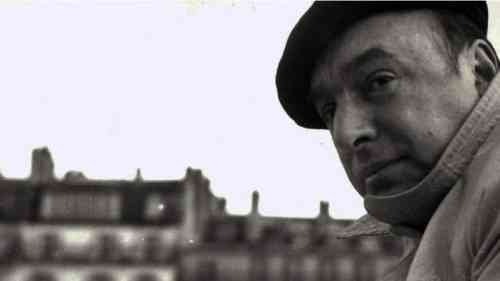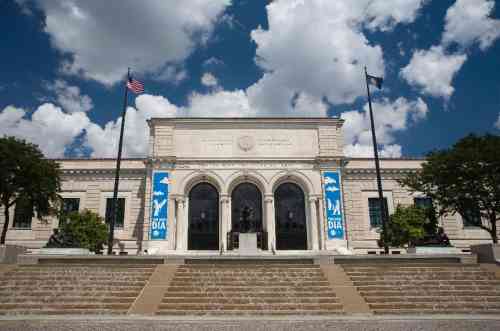Something Old, Something New, Something Borrowed, Something Blue

Something/Someone Old

My Something Old today is a poem from 1959, written by one of my favorite poets in the world, Pablo Neruda.

I'm giving it to you in its original Spanish first, because I'm undecided about which English translation I like best. I'll show you the two contenders for Best Translation after the original:
Soneto XVII
de Cien Sonetos de Amor
XVII
No te amo como si fueras rosa de sal, topacio
o flecha de claveles que propagan el fuego:
te amo como se aman ciertas cosas oscuras,
secretamente, entre la sombra y el alma.
Te amo como la planta que no florece y lleva
dentro de sí, escondida, la luz de aquellas flores,
y gracias a tu amor vive oscuro en mi cuerpo
el apretado aroma que ascendió de la tierra.
Te amo sin saber como, ni cuándo, ni de donde,
te amo directamente sin problemas ni orgullo:
así te amo porque no sé amar de otra manera,
sino así de este modo en que no soy ni eres,
tan cerca que tu mano sobre mi pecho es mía,
tan cerca que se cierran tus ojos con mi sueño.
Sonnet XVII
I don’t love you as if you were a rose of salt, topaz,
or arrow of carnations that propagate fire:
I love you as one loves certain obscure things,
secretly, between the shadow and the soul.
I love you as the plant that doesn’t bloom but carries
the light of those flowers, hidden, within itself,
and thanks to your love the tight aroma that arose
from the earth lives dimly in my body.
I love you without knowing how, or when, or
from where
I love you directly without problems or pride:
I love you like this because I don’t know any other way
to love,
except in this form in which I am not nor are you,
so close that your hand upon my chest is mine,
so close that your eyes close with my dreams.
—Translated and © Mark Eisner 2004, from City Lights' The Essential Neruda
Sonnet XVII
I do not love you as if you were salt-rose, or topaz,
or the arrow of carnations the fire shoots off.
I love you as certain dark things are to be loved,
in secret, between the shadow and the soul.
I love you as the plant that never blooms
but carries in itself the light of hidden flowers;
thanks to your love a certain solid fragrance,
risen from the earth, lives darkly in my body.
I love you without knowing how, or when, or from where.
I love you straightforwardly, without complexities or pride;
so I love you because I know no other way than this:
where I do not exist, nor you,
so close that your hand on my chest is my hand,
so close that your eyes close as I fall asleep. ”
― Pablo Neruda
I think the first line of Eisner's version is better, and that matters a lot (your first line had better be good if you want to keep people reading), but the second translator does a better job with the second stanza. How could you not love the following lines?
I love you as the plant that never blooms
but carries in itself the light of hidden flowers;
thanks to your love a certain solid fragrance,
risen from the earth, lives darkly in my body.
Wow.
What do you all think? First translation or second? I'm particularly interested in the opinions of those out there who read Spanish.
I've been trying to find a good spoken version of the Spanish so that you all can hear the texture of the original words, but most people seem to either swallow their words or declaim the poem as if they were a church sexton in a graveyard. The best version I've found so far is this guy who set the words to music:
And I included this simply because it's so fabulous to see Robin Williams reciting Neruda. If I'd known this was in Patch Adams, I would have watched it decades ago:
Something New

My Something New is a lovely present from my friends Christine and Judith Bush; a belated Yule gift they gave me when Kate and I stayed at their home on the way back from the Journey from Hell: Neruda: The Poet's Calling.

The book is by the same fellow who did the first translation of Sonnet XVII above, Mark Eisner. He has, apparently, been a scholar and translator of Neruda for many years. This is his most recent book, and supposedly a definitive biography of the poet (to the extent such things are possible, particularly about people like Neruda, who tend to evade overly simple classifications). I have only just dipped into it, but so far, so good. I'm looking forward to learning more about the poet.
Reading this book has made me realize something quite obvious that I should have noticed long ago: my two favorite Spanish-language poets, Neruda and Lorca, were linked not only in time (Neruda was only six years younger than Lorca), but also by their common struggle against fascism and authoritarianism of all kinds--and also by friendship. I didn't know they knew each other. I also did not know that they did not simply engage in comparable struggles against comparable tyranny in different places, but in the same specific struggle against fascism in Spain:
In 1927, Neruda began his long career as a diplomat in the Latin American tradition of honoring poets with diplomatic assignments. After serving as honorary consul in Burma, Neruda was named Chilean consul in Buenos Aires, Argentina, in 1933. While there, he began a friendship with the visiting Spanish poet Federico García Lorca. After transferring to Madrid later that year, Neruda also met Spanish writer Manuel Altolaguirre. Together the two men founded a literary review called Caballo verde para la poesîa in 1935. The outbreak of the Spanish Civil War in 1936 interrupted Neruda's poetic and political development. He chronicled the horrendous years which included the execution of García Lorca in Espana en el corazon (1937), published from the war front. Neruda's outspoken sympathy for the loyalist cause during the Spanish Civil War led to his recall from Madrid in 1937. He then moved to Paris and helped settle Spanish republican refugees in Chile.
https://poets.org/poet/pablo-neruda
That's what the Academy of American Poets says about it. It's interesting that they have an entry for Neruda; perhaps they actually include Central and South American poets as well as North American ones in the category of "American poets." That would be nice.
Something Borrowed
I found this rather lovely cover of my favorite Cyndi Lauper tune. Of course, you can't really improve on the original, but I thought this was a lovely performance. The performer gets a case of nerves, so it takes a while for her to get going, but it's worth it:
And here's the original for all of us who have loved it for years:
Cyndi Lauper actually meant something significant to me back when I was a teenager, in the bad old days where female role models were a lot thinner on the ground and Kate Jackson (the short-haired Charlie's Angel), Rizzo from Grease, and Princess Leia were among the very few inspiring (sort of?) figures available to a young girl. (Of the three of them, Leia is definitely the most inspiring.) If I'd been a bit older, possibly Mary Tyler Moore and Rhoda would have meant more to me. Anyway, though I respect Madonna a lot, I was always grateful that Cyndi Lauper was there for those of us who couldn't identify with being a gorgeous blond bombshell.
Something Blue

I didn't know, somehow, that Diego Rivera had done a series of murals about Detroit Life. As with all his murals, the artwork is inextricable from the building he painted it on, in this case the Detroit Institute of Art building:

Here's what it looks like on the inside:

Rivera's choice to paint directly on buildings makes his art vulnerable in a way I wonder if he was aware of (I'm guessing the answer is yes). If one wants to retain the art, one has to maintain the physical space, often a public space, where Rivera situated it. It's difficult to extract the art from the physical environment, which forces people to attend to the physical environment. As a socialist, I wonder how much Rivera thought about this. I'm guessing a lot.
Here are his images of Detroit:






Comments
The Anti-Marxist Thought Process of the Liberal Media Online
[video:https://www.youtube.com/watch?v=iG-O2RdmwNs]
Modern education is little more than toeing the line for the capitalist pigs.
Guerrilla Liberalism won't liberate the US or the world from the iron fist of capital.
I admit that I still have a fondness for this Lauper song...
[video:https://www.youtube.com/watch?v=JF9numkyLhA]
But then, I am living in NW Oregon... May actually make it to Renfair next week. Been meaning to for years, but always think of it after it's over.
So, Firebrick is bought on the forge, table is setup, now just to insulate and cut the burners. Measuring twice and all that.
Trying to disconnect as much as possible from the world. Neighbor who is supposed to cut the backyard still isn't, so I'm enjoying a bit of green space while it lasts. Wild grass to my waist is FUN, dammit.
I do not pretend I know what I do not know.
Wild grass to one's waist IS fun.
"More for Gore or the son of a drug lord--None of the above, fuck it, cut the cord."
--Zack de la Rocha
"I tell you I'll have nothing to do with the place...The roof of that hall is made of bones."
-- Fiver
good morning all
I kept an eye out for you CStMS last weekend at the festival. Didn't read your note till I got home Monday. The festival was hot in the afternoons. Swam in the Suwanee the hottest day. Discovered a great band...Gatorbone
Lis Williamson & The Gatorbone Band performing "Deep" live at the Flagler College Auditorium in St. Augustine, Florida Lon Williamson-Bass, Gabe Valla-Guitar, Jason Thomas-Violin
[video:https://www.youtube.com/watch?v=2RrzyDijNX4]
...and one more -
Gabe Valla performing his original song "Cumberland Road" with the Gatorbone Band Live at the Flagler Auditorium. The Gatorbone Band: Lis Williamson - Rhythm Guitar Lon Williamson - Bass Gabe Valla - Lead Guitar Jason Thomas - Violin
[video:https://www.youtube.com/watch?v=1mpcGob8xdc]
Hope you all have a good one!
“Until justice rolls down like water and righteousness like a mighty stream.”
I'm sorry I couldn't make it.
I just couldn't face the possibility of getting stranded on the road in that heat, and "Scalded Dog," our Mazda, was having difficulty starting.
I'm hoping soon I'll have gotten enough done on the house and enough debt paid down that I'll be able to travel again. That would be wonderful. If so, you're one of the people I'd like to stop by and see.
I hope that'll happen before the next festival, but if it doesn't, I'll see you there next year, if the creek don't rise.
"More for Gore or the son of a drug lord--None of the above, fuck it, cut the cord."
--Zack de la Rocha
"I tell you I'll have nothing to do with the place...The roof of that hall is made of bones."
-- Fiver
Morning everybody!
It is still morning, barely.
My mom's husband is now on the verge of death. I think at this point it will be a mercy.
It's good to come hear and "see" you all.
"More for Gore or the son of a drug lord--None of the above, fuck it, cut the cord."
--Zack de la Rocha
"I tell you I'll have nothing to do with the place...The roof of that hall is made of bones."
-- Fiver
There is a time when passing is merciful
May events progress in a natural manner for all those involved.
Still yourself, deep water can absorb many disturbances with minimal reaction.
--When the opening appears release yourself.
Hi. Glad you're back. Love this format!
Hola CSTMS. Late rising and slow waking up here. Spain
lost much to the Revolution and Franco. Fascists and similar totalitarians always attack, repress, and destroy arts and artists because art, whatever else it may, is quintessentially free and untamable. Even those who would co-opt and use it nonetheless destroy it, because in confining, directing and constraining it they morph it into something other than what it is and must be.
That, in its essence, is fascism--ownership of government by an individual, by a group, or by any other controlling private power. -- Franklin D. Roosevelt --
What the original art was meant to be
Somehow is a threat to the ones who would rather dictate meanings and interpretations for their own ignoble purposes.
OY
Zionism is a social disease
Think some of his work is in Chicago as well?
The depicted Diego Rivera murals were, at one time, very similar to the ones in train depots I used to frequent. Maybe New Orleans? Would have to search on that. Memory fails me.
Thanks for the old, borrowed & blue!
Zionism is a social disease
urg, translation of poetry is always fraught with peril.
for myself, after doing some research, I might compose the first line thusly:
Disclaimer 1: I don't actually speak/read Spanish.
Brag 1: I am an expert English speaker.
"Salt-rose" puzzled me, I immediately suspected that it was not some odd metaphor, but referred to something very specific -- but what could that be? Googling "Rosa de Sal" brought up all sorts of curious things, including a few songs with that title, a blog entry about Willa Cather (in Spanish?!?!), at least one woman named Rosa de Sal and at least one man named Sal de Rosa. At that point, I figured I was getting nowhere (especially since almost all of these hits were written in Spanish, and I don't ... well, you know).
So instead, I googled "Salt-rose", and lo and behold I hit an English-language site that analyses this poem. They translate the line as, "I do not love you as though you were the salt-rose, topaz" (note the introduction of the definite article). Check out this tidbit:
There's one small problem, which is that rosa rugosa is an Asian plant. Wikipedia notes that it is an exotic invasive in Europe and North American, but doesn't mention South America. That threw me off ... but then I searched for "rosa rugosa Chile", and sure enough I found online stores in Chile that sell some sort of powdered product made from rosa rugosa grown organically in Chile ... well, that's something, but I found nothing, anywhere, that referred to the plant colloquially as Rosa De Sal. On the other hand, further investigation turned up this (scroll down the page to see pictures) -- an unusual variety of salt with a pinkish-rose color that is mined in the Andean mountains! The difficulty here is that in Spanish the stuff is called, not "Rosa de sal", but "Sal rosa", or "Sal rosada", or "sal de rosa". So what the hell, is Neruda just fucking with us here? I am almost certain that this is the stuff he's referring to, given the subsequent reference to topaz ... so do we carry through his odd inversion, "rose of salt", or write what makes more sense, "salt of rose"? or maybe "rosy salt"? Maybe he quite cleverly intends to evoke both, which is a trick that cannot be duplicated in English, at least not trivially, because we aren't allowed to leave out articles (definite or indefinite).
So now I'm thinking that only an idiot would try to translate this poem without reading a Spanish analysis of the poem written by somebody from Chile, who would know exactly what "rosa de sal" refers to.
Which makes me very suspicious about the second line. Even though I don't speak Spanish, I'm familiar enough with the romance tongues to know that there is just something wrong with the translations offered. I refer again to that english analysis I found earlier. They translate the line as, "Carnation-arrow begot in flames" -- which to my eye looks a lot more like the Spanish. They also directly call out the second of the translations you found.
Oy. Perhaps it would be easier just to learn Spanish.
The earth is a multibillion-year-old sphere.
The Nazis killed millions of Jews.
On 9/11/01 a Boeing 757 (AA77) flew into the Pentagon.
AGCC is happening.
If you cannot accept these facts, I cannot fake an interest in any of your opinions.